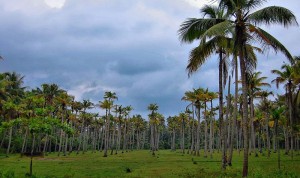Philippine News
Food security czar bats for creation of inter-agency task force vs coco infestation
MANILA — With more than one million coconut trees affected by insect pest “Aspidiotus Rigidus”, Presidential Assistant for Food Security and Agricultural Modernization Secretary Francis “Kiko” Pangilinan said an inter-agency task force will be organized to stop the spread of the disease from other coco-producing provinces.
Pangilinan, in an interview with the Philippines News Agency, said the inter-agency task force will be composed of representatives from the Philippine Coconut Authority (PCA) as the lead agency, Department of Agriculture (DA), Department of Interior and Local Government (DILG), and the Philippine Naional Police (PNP).
He said a command center will also be put up at the PCA central office in Quezon City to synchronize actions to be taken in combatting the disease that threatens the coconut industry.
According to PCA data, around 1,084,531 coconut trees were affected by the pest in the provinces of Batangas, Laguna, Quezon, Cavite, and Basilan as of May 2014.
President Benigno Aquino III earlier signed Executive Order No. 169 which directed the PCA and all concerned agencies to “formulate and prescribe” the necessary emergency measures and methodologies — mechanical, chemical, and biological — in the treatment of infested coconut trees and other host plants.
“This massive infestation of the scale insect poses a very serious threat to the coconut industry and to the livelihood of those who depend thereon,” the President said.
The President said the pests have been attacking other high-value crops such as coffee, cacao and mangosteen, that are cultivated under coconuts or near its plantations.
“If the spread of this invasive pest is not contained, it may wipe out the coconut industry not just in Calabarzon but, eventually, in the rest of the country,” he stressed.
Under EO 169, the PCA, in cooperation with the Office of the Presidential Assistant for Food Security and Agricultural Modernization, DA, Department of Science and Technology (DOST), DILG, University of the Philippines in Los Baños, and National Crop Protection Center, with the support of the appropriate Local Government Units, shall also be in charge of the declaration of infested areas to be under quarantine and the establishment of checkpoints and quarantine stations to prevent the transportation of unprocessed or untreated parts of coconuts, coconut seedlings and other host or vector plants from such areas.
The Bureau of Plant Industry (BPI) may deputize the PCA and the PNP and other law enforcement agencies to investigate and apprehend those caught violating the emergency and quarantine measures, including the confiscation of unprocessed/untreated parts of coconut, coco seedlings and seednuts, and other host/vector plants.
No coconut leaves or fronds, young coconut and other raw or unprocessed or untreated coconut products, coco seedlings, and seedlings of other scale insect host plants shall be transported outside of barangays, municipalities or provinces duly declared under quarantine because of scale insect infestation unless allowed by the PCA.
Pangilinan said he will conduct assemblies starting next week in the provinces affected by the coconut infestation to further determine the scope of damage and assist the affected coco farmers in rehabilitating their farms.
For its part, the PCA said it has allotted Php1.4-million to implement immediate and extensive measures to mitigate the scale-insect infestation in affected areas in 41 barangays of seven municipalities in the province of Batangas.
“PCA is continuously taking actions to prevent infestation to reach epidemic level so as not to affect nearby provinces like Laguna and Quezon,” said PCA Administrator Euclides G. Forbes, who has recently tendered his resignation to Malacanang.
“We are already looking for sustainable long-term solutions, such as biological control which takes time to be established and be effective, for the reason that natural enemies become absent as a result of extreme conditions, such as drought and typhoons,” he added.
Forbes said the PCA has already released 700 individuals of predatory coccinellids (Cryptolemus and Telsimia), beetles that eat scale insects in the affected areas as one of the mitigating measures to eliminate coconut insect. This will be done continuously until all scale insects in the affected areas have been treated.
Chemical control with contact or systemic insecticides is also being considered by the PCA. However, Forbes said the measure is only effective during the “crawler” stage of the pest, when the scale insect is very young and can only be safely administered for young palms and seedlings.
Meanwhile, Candida B. Adalla of the UPLB College of Agriculture has developed a botanical insecticide, from Gliricidia sepium, locally known as “kakawate”, which is proven to be effective at 97-percent mortality rate for the insect scale, which can be sprayed to coconut tress once in every three months until the infestation became manageable.
For years, Adalla said, the standard pest control against scale insect in coconut trees has been the concoction of coconut oil and dishwashing liquid or the cochin oil.
“But experience has shown that the insects are somewhat resistant; in many instances, the spraying of oil during daylight burns parts of the coconut trees. There is a strong pressure to me to release the product to the market but the Food and Drug Administration (FDA) has yet to release an approval pending toxicology test,” she said.
Adalla said the budget of the research, around half-a-million-pesos, was provided by the DOST, under its small-enterprises technology upgrading program, while the test for the botanical spray was conducted at the Lipa Agricultural Experiment Station and at the Philhybrid Makapuno Farm, in Lipa, Batangas.
The Philippines is the top supplier of coconut products in the world market, with the industry having an estimated USD 2 billion net foreign earnings.
It also provides livelihood to some 3.5 million coconut farmers all over the country.
According to the Bureau of Agricultural Statistics (BAS), annual production of coconut dropped by 3.3 percent — from 15.86 million metric tons (MT) in 2012 to 15.34 million MT last year.
In its latest Non-food and Industrial Crop Quarterly report, the BAS included the infestation of coconut trees in Batangas by scale insects as one of the reasons only 4-million MT coconut were harvested for the period October to December 2013, about 6.1 percent lower compared to 4.26 million MT in 2012 of the same period.
Super typhoon “Yolanda”, which battered coconut trees in Eastern Samar last year, and Typhoon “Pablo” in Mindanao in 2012 were also listed as major contributors to the drop in the production.






















